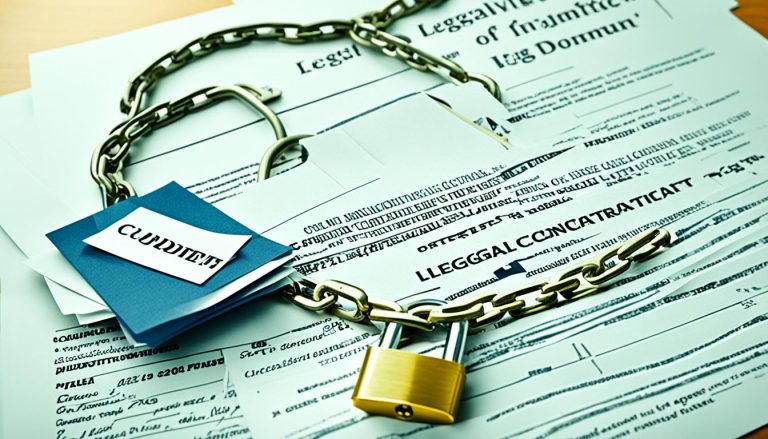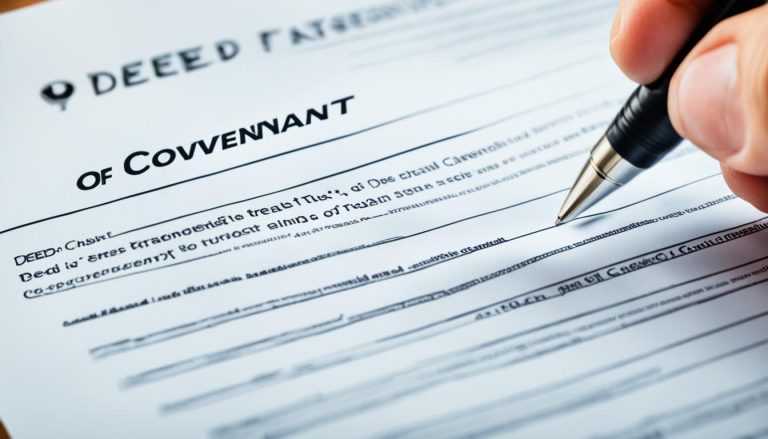Welcome to our article on covenant meaning in the property market in the UK. If you’re wondering what covenant means and its significance for property buyers and owners, you’ve come to the right place. In this article, we will dive into the legal aspects and implications of covenants, shedding light on this important topic.
What is a Covenant? – Covenant Meaning
To understand covenant meaning in the property market, it is essential to know what a covenant is. A covenant refers to a legally binding agreement or promise that is typically found in property contracts. It establishes certain obligations or restrictions that the property owner must abide by or restricts certain activities on the property.
A covenant acts as a set of rules or guidelines that govern the rights and responsibilities of property owners. It helps maintain a certain level of order and consistency within a neighborhood or development, ensuring that all parties involved comply with specific standards.
Definition of Covenant
A covenant can be defined as a contractual agreement that imposes obligations or restrictions on the owner of a property. These obligations or restrictions are often put in place to protect the interests of other property owners or to maintain the overall value and quality of the surrounding properties.
Types of Covenant
There are different types of covenants that can be found in property contracts. These include:
- Restrictive Covenants: These covenants impose limitations and restrictions on how the property can be used or developed. They may restrict certain activities such as building extensions, running certain businesses, or altering the appearance of the property.
- Positive Covenants: Positive covenants require the property owner to take certain actions or fulfill specific obligations. These can include maintaining the property, contributing to maintenance costs of shared facilities, or participating in community events.
- Mutual Covenants: Mutual covenants are agreements that involve obligations and responsibilities for both parties involved. They ensure that all parties have a shared responsibility in adhering to certain rules and regulations.
Each type of covenant serves a specific purpose in regulating and protecting the property market, ensuring that properties are used responsibly and harmoniously within their respective communities.
Finding Covenants on Property in the UK
Discovering covenants on a property is crucial for both potential buyers and current owners. Understanding the covenants attached to a property is essential for making informed decisions regarding its purchase or ownership. In this section, we will explore the various ways to find covenants on property in the UK, including reviewing the covenant agreement and conducting property searches.
Reviewing the Covenant Agreement
One of the primary ways to find covenants on a property is by reviewing the covenant agreement. This legal document outlines the specific obligations and restrictions that the property owner must adhere to. It is usually included in the property’s title deeds or lease agreement. By carefully examining the covenant agreement, potential buyers and current owners can gain valuable insights into the limitations and requirements associated with the property.
Conducting Property Searches
Another effective method of finding covenants on property in the UK is by conducting property searches. Several resources and databases provide access to information regarding property covenants. These sources include government websites, local authority records, and private companies specializing in property data. By conducting thorough property searches, individuals can uncover any existing covenants that may affect the property’s usage or future development.
Understanding and identifying covenants on a property is a crucial step in the property buying process. It ensures that potential buyers are aware of any limitations or restrictions associated with the property they intend to purchase. Similarly, current property owners can stay informed about their obligations to maintain compliance with the covenants. By utilizing both the covenant agreement and property searches, individuals can be well-informed and make informed decisions regarding their property ownership.
| Methods to Find Covenants on Property in the UK | Pros | Cons |
|---|---|---|
| Reviewing the Covenant Agreement |
|
|
| Conducting Property Searches |
|
|
 Image: Visual representation of finding covenants on property in the UK
Image: Visual representation of finding covenants on property in the UK
Legal and Biblical Covenants
Covenants have both legal and biblical connotations. Understanding the differences between these two types is essential for grasping their significance in various contexts.
Legal covenants primarily pertain to property ownership and agreements. These covenants are legally binding and are included in property contracts to establish specific obligations and restrictions for property owners. They serve to regulate property usage and maintain certain standards within a neighborhood or development. Legal covenants can be found in property deeds and often have implications for property values and the overall quality of an area.
Biblical covenants, on the other hand, hold religious or spiritual significance. They are based on religious texts, such as the Bible, and establish agreements or promises between individuals and a higher power. Biblical covenants serve as a foundation for faith and guide the beliefs, practices, and moral obligations of religious communities. These covenants are deeply rooted in religious teachings and shape the spiritual lives of believers.
While legal covenants focus on property ownership and agreements, biblical covenants center around religious and spiritual commitments. Both types play distinct roles in their respective realms and hold unique significance for those involved.
Key Differences Between Legal and Biblical Covenants
| Legal Covenants | Biblical Covenants |
|---|---|
| Enforceable by law | Based on religious texts and faith |
| Dictate property obligations and restrictions | Establish religious commitments and moral obligations |
| Regulate property usage and maintain standards | Guide beliefs, practices, and community values |
| Found in property contracts and deeds | Rooted in religious teachings and scriptures |
By recognizing the distinctions between legal and biblical covenants, individuals can gain a deeper understanding of the implications and impact of these agreements in their respective contexts.
Significance of Covenants
Understanding the significance of covenants is crucial for property buyers and owners. Covenants hold legal importance and have a profound impact on property ownership. Let’s explore why covenants are significant and how they play a pivotal role in regulating property usage and preserving the overall quality of a neighborhood or development.
Protection of Property Values
Covenants serve as a means to protect property values. By enforcing specific standards and restrictions, covenants ensure that properties within a community or development maintain a consistent level of quality. This not only benefits the property owners but also contributes to the overall desirability and attractiveness of the area, which in turn can help maintain or increase property values.
Maintaining Standards
Covenants play a vital role in maintaining standards within a community or development. They define the rules and regulations that property owners must adhere to, ensuring that everyone complies with the agreed-upon guidelines. These standards can encompass a wide range of aspects, such as architectural style, landscaping requirements, or even restrictions on certain activities that may impact the overall aesthetic or peacefulness of the area.
Preserving Community Cohesion
By establishing expectations and guidelines, covenants contribute to preserving community cohesion. They encourage a sense of unity among property owners and foster a collective effort to maintain the agreed-upon standards. This collaboration and mutual respect among residents create a harmonious community environment where everyone benefits from the shared commitment to upholding the covenant obligations.
Regulating Property Usage
Covenants are instrumental in regulating property usage. They can impose restrictions on certain activities, such as commercial operations or short-term rentals, to ensure that properties remain primarily dedicated to residential use. These regulations help safeguard the residential character of a neighborhood or development and prevent any detrimental effects on the quality of living for residents.
| Key Points | Benefits |
|---|---|
| Protect property values | Enhanced investment returns |
| Maintain standards | Promote a desirable environment |
| Preserve community cohesion | Create a sense of belonging |
| Regulate property usage | Ensure a residential focus |
As demonstrated, covenants have a significant role to play in the world of property. They safeguard property values, maintain standards, promote community cohesion, and regulate property usage. By understanding the significance of covenants, property buyers and owners can make informed decisions and contribute to the preservation and enhancement of their property and the surrounding community.

Different Types of Covenants
Covenants in the property market come in various forms, each with its own specific requirements and restrictions. Understanding these different types of covenants is essential for property buyers and owners. In this section, we will discuss the various types of covenants commonly encountered in the UK property market. These may include:
- Restrictive Covenants: These covenants place restrictions or limitations on the use and development of a property. They aim to maintain specific standards and preserve the character of a neighborhood or development.
- Positive Covenants: Positive covenants require the property owner to take certain actions or fulfill specific obligations, such as contributing to the maintenance of shared facilities or paying annual fees toward community services.
- Mutual Covenants: Mutual covenants involve agreements between multiple parties who have a shared interest in a property or development. These covenants outline obligations and responsibilities that each party must uphold.
Comparison of Different Types of Covenants
| Covenant Type | Description | Examples |
|---|---|---|
| Restrictive Covenants | Restrict certain activities or developments on a property to maintain specific standards and preserve neighborhood character. | Noise restrictions, architectural guidelines |
| Positive Covenants | Require property owners to fulfill specific obligations or take certain actions for the benefit of the community or shared facilities. | Contributing to maintenance fees, supporting community events |
| Mutual Covenants | Agreements between multiple parties with shared interests in a property, outlining obligations and responsibilities for each party. | Shared responsibility for maintenance, joint decision-making |
Understanding the different types of covenants is crucial for property buyers and owners, as it enables them to navigate the specific requirements and restrictions associated with their property. By being aware of these covenants, individuals can ensure compliance and maintain harmony within the community or development.
Covenants in Religion and Law
Covenants hold significant meaning not only in the property market but also in religious and legal contexts. Let’s explore how covenants are understood and practiced in different faiths, as well as their impact on contractual agreements and obligations within the legal system.
Covenant in Religion
In religious contexts, a covenant refers to a sacred agreement or bond between individuals and a higher power. It represents a commitment to uphold specific principles, values, or commandments. Covenants vary across different faiths, each carrying its own set of spiritual, moral, and ethical obligations.
For example, in Christianity, the Old Testament describes the covenant between God and the Israelites, symbolizing their special relationship and the laws they were expected to follow. This covenant established a guide for righteous living and formed the foundation of their religious practices.
In Islam, the Quran outlines the concept of a covenant (mithaq) between Allah and humanity, emphasizing the eternal bond between God and His creation. This covenant includes the responsibility of adhering to Islamic principles, such as prayer, fasting, and charity.
Similarly, other religions, including Judaism, Hinduism, and Buddhism, have their own interpretations and teachings around covenants, demonstrating their significance in guiding believers’ moral and spiritual conduct.
Covenant in Law
In the legal realm, covenants play a vital role in establishing agreements and obligations between parties. They are commonly used in contractual relationships to ensure that all parties involved understand their rights, responsibilities, and limitations.
Covenants in law often outline specific terms, conditions, and restrictions that must be upheld by the parties involved. For example, in property law, restrictive covenants can place limitations on how a property can be used, ensuring that certain standards and regulations are maintained within a community or development.
Furthermore, covenants in commercial contracts may govern aspects such as confidentiality, non-compete clauses, and intellectual property rights. These legal covenants establish clear boundaries and expectations, protecting the interests of all parties and fostering a fair and transparent business environment.

| Aspect | Covenant in Religion | Covenant in Law |
|---|---|---|
| Meaning | Sacred agreement between individuals and a higher power | Legal agreement between parties |
| Intent | Moral and spiritual guidance | Establishing rights, responsibilities, and limitations |
| Scope | Specific to religious practices and beliefs | Encompasses various legal aspects |
| Enforcement | Religious principles and accountability to a higher power | Legally binding, with potential legal consequences for non-compliance |
While covenants in religion and law differ in their nature, they both serve to establish commitments and provide a framework for the proper functioning of personal, communal, and legal relationships.
Now that we have explored the significance of covenants in religion and law, let’s examine the proper pronunciation of terms commonly associated with covenant meaning.
Pronunciation of Covenant and Covenanted
The pronunciation of certain terms, such as “covenant” and “covenanted,” can vary. To ensure clarity in both written and spoken discussions involving covenant meaning, we provide a phonetic guide on how to correctly pronounce these words.
| Word | Phonetic Pronunciation |
|---|---|
| Covenant | [kuhv-uh-nuhnt] |
| Covenanted | [kuhv-uh-nuhnt-ed] |
Conclusion
In conclusion, covenant meaning holds great significance in the property market in the UK. Whether you are a buyer or an owner, understanding the legal obligations and restrictions imposed by covenants is crucial for making informed decisions and effectively managing your property.
By exploring the intricacies of covenant meaning, we have provided valuable insights into the complexities of property ownership. These insights enable you to navigate the property market with confidence, ensuring that you are aware of the rights and responsibilities associated with your property.
From maintaining specific standards to protecting property values, covenants play a fundamental role in preserving the overall quality of neighborhoods and developments. They contribute to the harmonious coexistence of residents and help create desirable living environments.
In summary, covenant meaning helps establish a sense of community and ensures that property owners uphold their obligations. By understanding and respecting these covenants, property owners contribute to the overall well-being of the property market and the enjoyment of everyone involved.
FAQ
What is a covenant?
A covenant refers to a legally binding agreement or promise that is typically found in property contracts. It establishes certain obligations or restrictions that the property owner must abide by or restricts certain activities on the property.
How can I find covenants on a property in the UK?
You can find covenants on a property in the UK by reviewing the covenant agreement and conducting property searches. It’s essential to understand the covenants attached to a property before making any decisions regarding its purchase or ownership.
What are the differences between legal and biblical covenants?
Legal covenants pertain to property ownership and agreements, while biblical covenants have religious or spiritual significance and are often found in religious texts.
Why are covenants significant?
Covenants are significant as they protect property values, maintain specific standards, regulate property usage, and preserve the overall quality of a neighborhood or development.
What are the different types of covenants?
The different types of covenants commonly encountered in the property market include restrictive covenants, positive covenants, and mutual covenants.
How do covenants relate to religion and law?
Covenants hold significance in both religious and legal contexts. In religion, they are understood and practiced differently across various faiths. In law, covenants impact contractual agreements and obligations.
How do you pronounce “covenant” and “covenanted”?
The correct pronunciation of “covenant” is “kuhv-uh-nuhnt” and “covenanted” is “kuhv-uh-nuhn-tid”.





